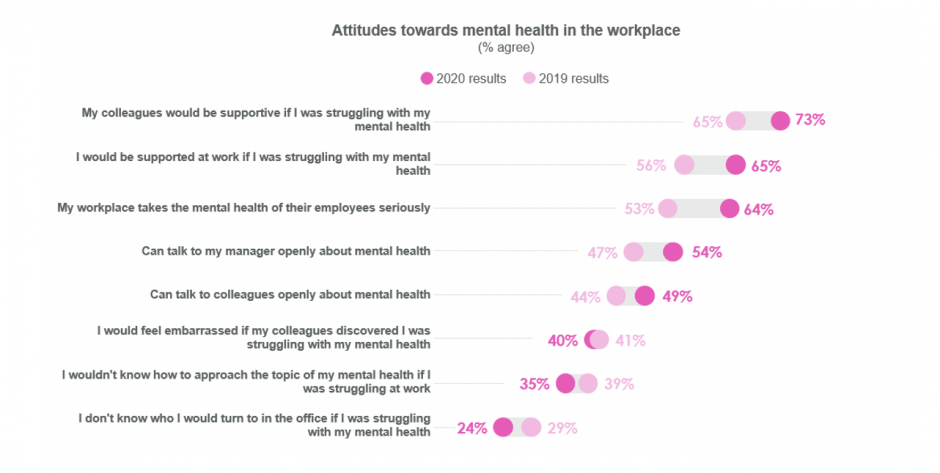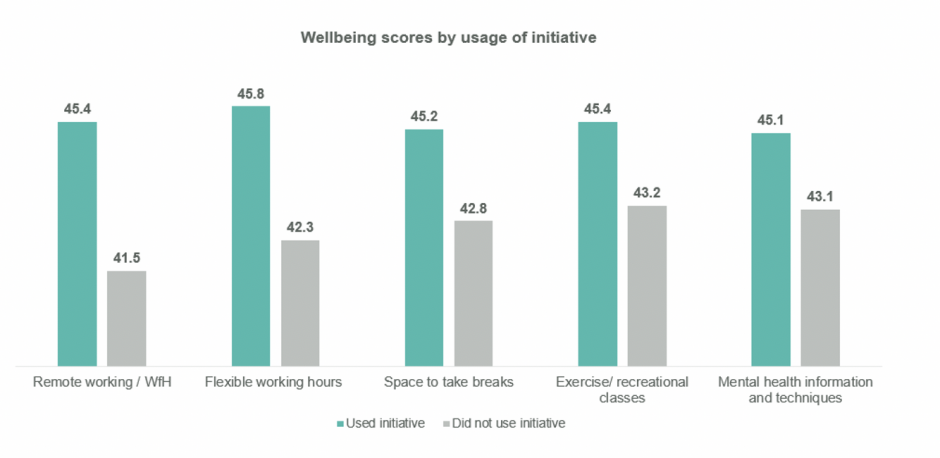Measuring the mental wellbeing of the PR and comms industry (and what it means for you)
For the second year, Opinium partnered up with the Public Relations and Communications Association (PRCA) to assess the mental wellbeing of those working in the PR and communications industry, explore how those in the industry are coping in the context of a pandemic, and understand what more needs to be done to support our colleagues, friends and families.

Measuring the Mental Wellbeing of the PR and Comms industry (and what it means for you)
Using our Workplace Mental Wellbeing Audit, this year’s study was made even more pertinent by the outbreak of the coronavirus and the subsequent lockdown. The combination of isolation from friends and family, a major economic downturn, and the threat to our physical health, created – and continues to create – an environment that is far from conducive to good mental wellbeing.
We distilled the findings down to three key recommendations for employers:
The importance of sharing stories
The culture around mental health has started to shift, with those who speak up benefiting from greater support, and while Covid-19 has had a huge impact on the industry, attitudes towards mental wellbeing have improved overall. However, there are still many who are struggling but have not taken time off – work is still needed to create a shift in workplace culture.
Challenges:
Well-being scores amongst the PR/Comms industry have fallen, and are now lower than UK workers at large.
Workload remains an issue, it is the biggest source of stress (55%), and also the main reason for not taking time off for mental health (48%, up from 43% in 2019).
The ‘impact of coronavirus on the company’ is the second biggest source of stress (44%).
Two-in-five PR professionals would still feel embarrassed if their colleagues discovered they were struggling with their mental health (stable with 41% in 2019).
Progress:
Those who did take time off for mental health are being more open with employers about this. Over seven-in-10 told their employer that they were taking time off for mental health rather than saying it was for something else (+32% from 2019).
Employers are taking mental health more seriously and PR professionals are noticing this with nearly two thirds (64%) stating that they feel their employer takes the issue of mental health and wellbeing of employees seriously (vs 53% in 2019).

Key takeaway: encourage sharing stories in a relatable manner, especially by senior leaders, to create a workplace culture where mental health can be discussed openly and without fear of consequence.
Promote existing initiatives and introduce new ones
There has been a significant increase in the number of employers offering mental wellbeing initiatives to employees. The challenge now comes with ensuring employees understand how to access these initiatives and feel comfortable using them. There are also a number of initiatives that show demonstrable impacts on mental wellbeing, such as remote working and flexible working hours.

Wellbeing scores
Key takeaway: listen to employees to prioritise the initiatives which matter most to them and which have the greatest impact on mental wellbeing, rather than those which are easiest to introduce.
Learn from the lockdown
Opinium’s research showed that working from home during lockdown provided a number of benefits for employees; they were more relaxed, enjoyed avoiding the commute, and had more time for other hobbies and interests. That said, the picture was perfect and not everything about lockdown was easy.
Lockdown has improved mental wellbeing for some in the PR and comms industry with 40% stating that it has improved their mental wellbeing, however 41% say it has harmed their wellbeing.
Positives of working from home include not having to commute (66%), feeling more relaxed (55%) and improved work / life balance (51%).
Challenges include struggling to keep in contact with colleagues (63%), finding it hard to draw boundaries between work and home (58%) and working longer hours (51%).
Overall, a staggering 96% of those surveyed want to continue to work from home in some capacity post-Covid-19.
Key takeaway: For employers, we recommend exploring how to make some of these changes to working patterns permanent and to offer your staff greater flexibility.
The last 12 months have undoubtedly been challenging. But they have also highlighted the opportunity before us. The opportunity to take this crisis to re-examine our working practices and make them better. To create a culture in which mental wellbeing is treated the same as physical wellbeing. To embrace a culture of openness that lasts long after the pandemic is over.
The opportunity is ours – we just need to take it.



 Print the article
Print the article